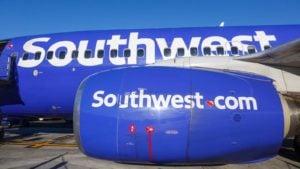Amid troubling inflation data that spells substantial headwinds for the consumer economy, the concept of travel stocks to buy seems challenged at the very least. However, investors must also consider the broader context of the coronavirus pandemic, which denied many households milestone moments such as long-planned vacations. Now, the concept of revenge travel is kicking in, inspiring people to leave their homes for some adventure.
But is this phenomenon powerful enough to overcome the obvious dangers of rising inflation? Frankly, we shouldn’t be naïve about the damage inflicted on the consumer. However, as I discussed in my interview with CGTN America, consumers are mitigating their plans – such as shifting to domestic locations – not abandoning them outright. Cynically, this may bode well for travel stocks to buy.
Also, it’s possible that fears of a recession may inspire some families to take the plunge. Under a now-or-never mentality, consumers may decide to make new memories to make up for lost time – while they still have the jobs to do so.
Therefore, travel stocks to buy is not as hopeless of a concept as it might seem. Indeed, there’s a chance for surprising upside here.
| Ticker | Company | Current Price |
| MAR | Marriott International, Inc. | $152.22 |
| LUV | Southwest Airlines Co. | $37.22 |
| UAL | United Airlines Holdings, Inc. | $36.99 |
| ABNB | Airbnb, Inc. | $98.87 |
| EXPE | Expedia Group, Inc. | $101.93 |
| HTZ | Hertz Global Holdings, Inc. | $17.24 |
| NCLH | Norwegian Cruise Line Holdings Ltd. | $11.12 |
Travel Stocks to Buy: Marriott International (MAR)

One of the most famous operators of hotels and timeshare properties, Marriott (NASDAQ:MAR) might appear to be a candidate for equities to dump, not travel stocks to buy. Given the circumstances of higher inflation and perhaps no effective way of controlling it without some serious pain involved, the hotel industry doesn’t sound appealing. Nevertheless, MAR is down only 7% on year-to-date basis.
Compare that to the benchmark S&P 500, which is down more than 21% over the same frame and you get a sense of just how powerful revenge traveling could be. Another factor that might catch some folks unaware is Marriott’s financial performance. For the first quarter of 2022, the company rang up $4.2 billion in revenue, up 81% from the year-ago quarter.
Not only that, it posted net income of $377 million, a far more favorable outcome than the loss of $11 million in Q1 2021. While past results are no guarantee of future performance, the consumers’ desire to make up for lost time may tip the needle in favor of MAR stock.
Southwest Airlines (LUV)

Flying in the friendly skies is no longer a great experience for travelers or service workers these days. For instance, one of the stories that popped up in the news feed for Southwest Airlines (NYSE:LUV) is a Fox Business report (I won’t link to it) that a passenger who, let’s just say committed a Section 8 discharge, was rightfully jailed.
From air rage to now this, the growing inability for transportation service workers to do their jobs is a serious risk factor for all travel stocks to buy. I’m not going to deny reality: it’s a tough market out there.
Still, it’s also possible that given the strength of the revenge travel phenomenon, Southwest Airlines could rise above the muck. While inflation has impacted the consumer economy, people still want to go about and make new experiences. In many cases, they’re focusing their itineraries closer to home. Of course, such a dynamic helps LUV, which is mostly geared toward domestic routes.
United Airlines (UAL)

If domestic airliners had it bad, those with international travel routes like United Airlines (NASDAQ:UAL) had it worse. For instance, in the full year 2021, Southwest posted a net income of $977 million after suffering a net loss of $3 billion in the year prior.
On the other hand, United Airlines incurred a loss of $7 billion in 2020 due to the coronavirus pandemic shutting flights down everywhere. While the following year was an improvement, it was just a paring of losses to nearly $2 billion in the red. Even in Q1 2022, United posted a net loss, suggesting it has a mountain to climb.
However, if you believe in travel stocks to buy, UAL could be a contrarian idea. You must have nerves of steel, to be sure. But if that describes your investing profile, more international locations are loosening their Covid-related restrictions. By the end of this year, United could be looking at a different picture.
Travel Stocks to Buy: Airbnb (ABNB)

Back when constantly monitoring the number of Covid-19 cases was an ingrained ritual, the idea of listing Airbnb (NASDAQ:ABNB) as one of the travel stocks to buy must have come off as absurd. First, arguably few wanted to be in enclosed spaces with strangers for more time than was necessary. Second, if you had to stay somewhere away from home, you’d rather do it in a place with a professional cleaning crew on staff.
But with Covid fears fading, Airbnb might be relevant again. When you look at packed sports arenas, for example, it’s clear that millions of folks are even tired of mask mandates. So, the difference between professionally and personally managed rental properties is blurred in the sense that travelers don’t seem to care anymore.
In addition, Airbnb might be an effective way of combating inflation. Big hotels have big overhead, while circumstances for residential property owners could be different. There might be deals to be had, making ABNB potentially one of the travel stocks to buy.
Expedia Group (EXPE)

An online travel company, Expedia (NASDAQ:EXPE) suffered horrendously when the Covid-19 pandemic initially upturned society. From vehicle miles traveled to load factors for U.S. air carriers, the movement of people came to a virtual standstill in the spring of 2020, boding ominously for travel stocks to buy.
In 2020, Expedia only generated $5.2 billion in sales, a far cry from the $12 billion it posted a year prior. However, it’s possible that the overwhelming desires of consumers seeking experiences lost during the pandemic could once again lift EXPE. In Q1 2022, the company generated revenue of $2.2 billion, which was more than 80% higher than its year-ago sales.
But is this enough evidence to slot EXPE as one of the travel stocks to buy? Given the number of Americans who said they planned to go out on vacation for Memorial Day weekend, the demand just might be there, even if it’s not available for other consumer segments.
Hertz Global Holdings (HTZ)

Emblematic of the catastrophic headwinds imposed upon travel stocks to buy during the initial wave of the Covid-19 crisis, the bankruptcy of Hertz (NASDAQ:HTZ) shocked the global community. Now back on the saddle, the rental-car service is one of the controversial names on this list. While risks for HTZ certainly abound, it’s also possible that it could benefit from the current backdrop.
As with other travel stocks to buy, the desire for experiences has bolstered demand for the overall industry. Cooped up at home for roughly two years, seemingly most consumers have had enough. Just as importantly, the inflationary cycle we’re in may benefit Hertz – particularly for families – as going on road trips may be a more economical alternative to flying.
Whether this demand holds up remains to be seen. Obviously, if the economy plunges, it might be bad news for Hertz all over again. However, people may end up just vacationing closer to home, which might sustain HTZ.
Travel Stocks to Buy: Norwegian Cruise Line (NCLH)

For the last name on this list of travel stocks to buy, I’m going to dial up the speculation with Norwegian Cruise Line (NYSE:NCLH). To be upfront, I have serious concerns about the entire cruise ship industry. After suffering heavy losses from the Covid-19 pandemic, the sector must bounce back in a massive way. However, the economic challenges of the moment present hefty risks.
Nevertheless, Norwegian could make a comeback, mainly because cruise ships represent one of the most cost-effective means of vacationing. What negatively affected the industry earlier – basically fears of Covid-19 infection – has faded into the background. Presumably, then, more people are open to the idea of hitting the high seas.
However, at the current revenue run rate of $522 million in Q1 2022, it’s nowhere near where Norwegian needs to be to match pre-pandemic norms. As well, the company continues to bleed money. Therefore, only gamble here if you have high conviction that the travel industry can make a big comeback.
On the date of publication, Josh Enomoto did not have (either directly or indirectly) any positions in the securities mentioned in this article. The opinions expressed in this article are those of the writer, subject to the InvestorPlace.com Publishing Guidelines.
